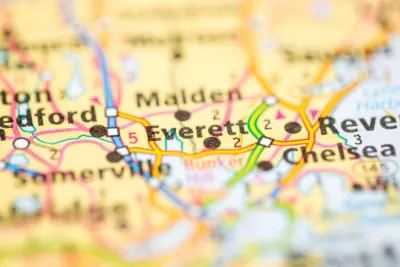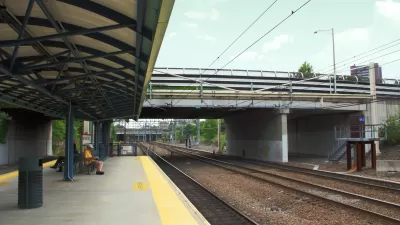To avoid the pitfalls of disconnected, car-centric suburbs, local governments must proactively plan for sustainable development in growing areas.

The area experiencing the most rapid growth in Massachusetts is, according to Amy Dain, "a place without an identity or united governance, a district that straddles the Mystic and Malden Rivers at the intersection of six cities: Everett, Medford, Somerville, Chelsea, Malden, and also a bit of Boston, at Charlestown." A proposed 21-story tower recently drew attention to the area for its outsized height. Since then, another two high-rise projects have been built or proposed. The region is "a natural hub between Boston-Cambridge-Somerville, the North Shore, and 128-North," an area primed for urban development with an existing "framework for connectivity" and surrounded by residential communities, employment centers, and amenities. "The six-city area is like a city center, for its density and mix of everything. Except it is not like a city center, at least not yet. For now it is an archipelago of private developments in need of the public connectivity so well known in historic downtowns."
With this growth, Dain argues, comes a need for "good government oversight and public investment" to ensure equitable, sustainable development. "Without public intervention, private developments will be primarily car-oriented, even when located near train stations, rivers, and rail trails." The same, Dain writes, goes for affordable housing and commercial real estate. "The market will not, on its own, deliver new buildings priced for low-income residents and scrappy entrepreneurs. It is the role of government to make sure that diversity gets built in when all-new city-centers rise." Dain asserts that local governments must emphasize "building for non-car mobility" which "takes so much more planning and coordination, across government bodies and parcels of land." As the region grows, "our shared task is not to build a series of gated-style, car-oriented developments, but to grow a resilient downtown for everyone."
FULL STORY: Building a city center serving six cities

Maui's Vacation Rental Debate Turns Ugly
Verbal attacks, misinformation campaigns and fistfights plague a high-stakes debate to convert thousands of vacation rentals into long-term housing.

Planetizen Federal Action Tracker
A weekly monitor of how Trump’s orders and actions are impacting planners and planning in America.

In Urban Planning, AI Prompting Could be the New Design Thinking
Creativity has long been key to great urban design. What if we see AI as our new creative partner?

Cal Fire Chatbot Fails to Answer Basic Questions
An AI chatbot designed to provide information about wildfires can’t answer questions about evacuation orders, among other problems.

What Happens if Trump Kills Section 8?
The Trump admin aims to slash federal rental aid by nearly half and shift distribution to states. Experts warn this could spike homelessness and destabilize communities nationwide.

Sean Duffy Targets Rainbow Crosswalks in Road Safety Efforts
Despite evidence that colorful crosswalks actually improve intersection safety — and the lack of almost any crosswalks at all on the nation’s most dangerous arterial roads — U.S. Transportation Secretary Duffy is calling on states to remove them.
Urban Design for Planners 1: Software Tools
This six-course series explores essential urban design concepts using open source software and equips planners with the tools they need to participate fully in the urban design process.
Planning for Universal Design
Learn the tools for implementing Universal Design in planning regulations.
Appalachian Highlands Housing Partners
Gallatin County Department of Planning & Community Development
Heyer Gruel & Associates PA
Mpact (founded as Rail~Volution)
City of Camden Redevelopment Agency
City of Astoria
City of Portland
City of Laramie





























